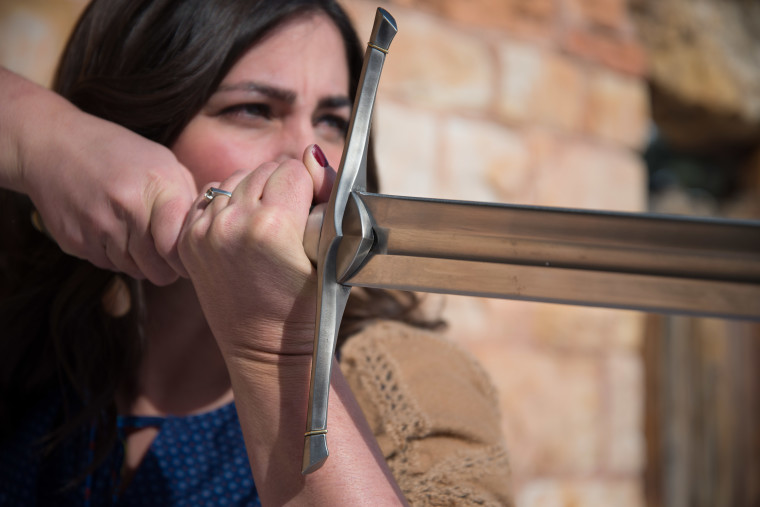I loved Laurie’s recent words on praying like an overcomer. Not only the boldness and beauty of them, but also their gospel-groundedness. This encouragement to take on the mentality of an overcomer is not just an isolated idea in the Bible, but it is an essential crux in the story of God. Allow me to remind you with a quick allegory.
A lover builds his wife an estate, carefully crafted for her enjoyment down to the finest details. He pours his heart out in the work and he gives it to her as a gift of love, the keys wrapped in a beautiful ribbon. Of course they will enjoy it together but there is something about giving a thing to someone you love.
She does love it and they do enjoy it together, at least at first. Before long the man’s enemy comes, and with tricky words he seduces the man’s beloved. The enemy tells her lies and talks her into giving him the whole estate, and she agrees.
She is worse than a victim–she is a traitor. She betrays her lover and hands the enemy the keys to her kingdom. She becomes a captive in her own estate.
The lover is enraged. Although it costs him everything, he gloriously defeats the enemy, takes back the keys, and rescues his beloved–mercifully and beautifully taking her back into his arms despite her betrayal. He lays down his life to heal and restore her. He is full of mercy and compassion toward her.
Of course, God is the Lover, we are his wife, and his enemy is the devil. The estate is the world, the planet earth.
God gave us authority over the earth; in Eden we handed it to the enemy. But Jesus came to destroy the works of the devil and was given all authority both in heaven and on earth.
What happens next in this story is crucial because it reveals something beautifully poetic about God’s heart toward us and our part in the story of the gospel.
Having regained authority over the estate and having defeated–but not yet destroyed–the enemy, the lover doesn’t send his bride off to her room. He doesn’t keep her locked up as punishment, or even to await the final victory in safety. No, what he does is much better than that.
Although Jesus gained all authority over both heaven and earth–having disarmed the powers and authorities, he made a public spectacle of them, triumphing over them by the cross, we find what is perhaps a puzzling phrase in the book of First John: “the whole world lies in the power of the evil one.”
Why would Jesus take authority over the earth yet leave it under the power of the enemy?
I can think of two reasons. For the story, and for the Bride.
 God is a poet. Just flip through your Bible. Can there be any question? He loves the shape of a great story. Jesus finds the disciples after a fruitless night of fishing and gives them a miraculous catch. So when all their hopes are dashed after his crucifixion, how does the resurrected Christ reveal himself? He finds them fishing after a fruitless night and gives them a miraculous catch.
God is a poet. Just flip through your Bible. Can there be any question? He loves the shape of a great story. Jesus finds the disciples after a fruitless night of fishing and gives them a miraculous catch. So when all their hopes are dashed after his crucifixion, how does the resurrected Christ reveal himself? He finds them fishing after a fruitless night and gives them a miraculous catch.
Symmetry and poetic motifs are everywhere in the Bible. Here’s a favorite of mine. Peter denies Jesus three times; Jesus gives him three opportunities to proclaim his love and receive his assignment. What a great example of Jesus’s careful, even extravagant way of intentionally redeeming people.
Which leads us back to the bride in our story.
The enemy is beaten but not gone. What does the Lover do next? Although he could easily finish off the enemy himself, that would not fit his poetic heart, nor his desire to redeem.
He crafts a chapter that will shock his enemy by bringing a plot twist that could only be called poetic justice.
He arms her.
He doesn’t send her away in shame; he calls her to rise up and puts a sword in her hand almost as if to say, “I am going to allow you this pleasure.” He gives her a new chance to subdue the earth, to rule and reign, to regain all of the ground she surrendered.
She’s not left alone hoping it will be over soon. They are together fighting the forces of the enemy, not desperately hoping for a victory, but from the assurance of his victory.
And this is the age we find ourselves in, the age of taking back what we surrendered. The victory is his but he makes sure it is not his alone, but also ours together.
We were worse than victims but now we are more than conquerors.
It is not ours in this hour to surrender this world to darkness, looking for our escape, but to take up the battle that is not against flesh and blood, but mighty for pulling down strongholds.
Not even death can intimidate her, for the Lover defeated even death itself, and that is why the warrior bride makes hell tremble.
 Photos: Eye of Rie
Photos: Eye of Rie
